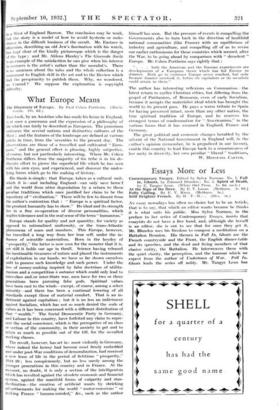What Europe Means
Tills book, by an Austrian who ha i made his home in England, is at once a panorama and the expression of a philosophy of life which can fairly be described as European. The panorama embraces the several nations and distinctive cultures of the West ; and the features of the landscape are defined at various points in time, from the 'seventies to the present day. The observations are those of a travelled and cultivated " Euro- pean," and the general effect is pleasing, highly subjective, of course, but not particularly interesting. Where Mr. Cohen Portheim differs from the majority of his tribe is in his de- liberate effort to pierce the superficial life which he has seen with his own eyes, and experienced, and discover the under- lying forces which go to the .making of history.
His thesis is simple : that Europe, taken as a cultural unit, which it is—and including England—can only save herse'f and the world from utter degradation by a return to those peculiar, traditions which once justified her claim to be the repository of " civilization." There will be few to dissent from the author's contention that : " Europe is a spiritual factor, the greatest humanity has to show." Its ideal and its strength lies in a free co-operation of diverse personalities, which implies tolerance and in the real sense of the term "humanism."
Europe stands for quality and not quantity, for variety as opposed to rationalized uniformity, or the trans-Atlantic phenomena of mass and numbers. This Europe, however, has travelled a long way from her true self, under the in- fluence of scientific materialism. Born in the heydey of "prosperity," the latter is now seen for the monster that it is, yet still it holds our age in thrall. Science having released the inestimable treasures of nature and placed the instruments of exploitation in our hands, we have so far shown ourselves unfit to possess such knowledge and such power. Under the lure of money-making inspired by false doctrines of utilita- rianism and a competition a autrance which could only lead to inter-class and/or inter-State war, men have for two or three generations been pursuing false gods. Spiritual values have been cast to the winds—except, of course, among a select minority—and there has been a continual lowering of all standards except those of material comfort. That is an in dictment against capitalism ; but it is no less an indictment against Socialism, which has not so much denied the scale of values as it has been concerned with a different distribution of that "wealth." The Social Democratic Party in Germany, and Labour in this country, have forfeited any claim to repre- sent the social conscience, which is the prerogative of no class or section of the community, in their anxiety to get and to retain as much as possible out of the till, for the so-called working classes.
The revolt, however, has set in : most violently in Germany, where indeed the heresy had become most firmly embedded and under post-War conditions of demoralization, had received a new lease of life in the period of fictitious "prosperity," 1924- 29 ; less conspicuously, but no less surely among the Younger generations in this country and in France. At the moment, no doubt, it is only a section of the intelligentsia Which has revolted against the obsolete economic and financial System,. against the manifold forms of vulgarity and stan- dardization—the creation of artificial wants by shrieking advertisements for making the world " motor-consciotis " or making France "banana-minded," &c., such as the author himself has seen. But the pressure of events is compelling the Governments also to turn back in the direction of healthful national communities (like France) with an equilibrium of industry and agriculture, and compelling all of us to revise our earlier enthusiasms for those countries which seemed, after the War, to be going ahead by comparison with " decadent " Europe. Mr. Cohen Portheim says rightly that : .
6 4
• • both the American and the Russian experiments are developments of a European thesis which has led Europe to disaster. Both go to extremes Europe never reached, but only because disaster overtook it, before its capitalists or its socialists could attain to them."
The author has interesting rellexions on Communism—the latest return to earlier Christian ethics, but differing from the gospel of Puritanism. of Rousseau, even of early Socialism, because it accepts the materialist ideal which has brought the world to its present pass. He pays a warm tribute to Spain for having preserved intact, more than any other nation, the true spiritual tradition of Europe, and he reserves his Strongest terms of condemnation for "Americanism," in the various forms that it has assumed in England, France and Germany.
The great political and economic changes heralded by the advent of the National Government in England will, in the cuthoes opinion (remember, he is prejudiced in our favour), enable this country to lead Europe back to a consciousness of her unity in diversity, her own peculiar liberal" traditions. W. HORSFA.11. CARTER.






























 Previous page
Previous page